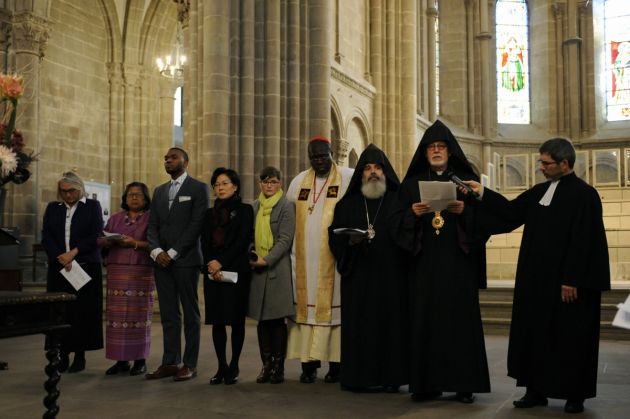Prayers at service commemorating Armenian genocide turn to Paris, Beirut attacks

They met in Geneva's St. Pierre Protestant Cathedral and the central focus of their Sunday prayers was to have been to commemorate the Armenian Genocide of 1915-23.
The year 2015 marks the 100th anniversary of the beginning of the Armenian genocide, in which an estimated 1.5 million Armenians perished at the hands of Ottoman Turks from 1915 to 1923.
But two days before the Nov. 15 service, 129 people were killed in Paris in suicide attacks by extremists claiming to represent Islam. And the day before the Paris attack, 43 people were slain in Beirut by suicide bombers claiming to represent the same terrorists.
Hundreds of others people were injured in both attacks which they group calling itself Islamic State carried out.
At the St. Pierre service in the historical Geneva old town, the prayers of the Protestant Church of Geneva and the executive committee of the World Council of Churches took on a new dimension, the WCC reported.
Armenian archbishop Vicken Aykazian, a member of the WCC's main governing body, its central committee, was one of those who led prayers of intercession for the martyrs and all who suffered during the 20th-century genocide, and also "for victims today in Beirut and Paris."
He also quoted from a statement adopted over the weekend by the WCC's executive committee which was meeting near Geneva.
"In the face of this brutality, the human family, all people of faith and of good will, must stand together to recommit to respecting and caring for one another, to protecting one another, and to preventing such violence."
Armenian archbishop Nareg Alemezian, a member of the WCC's executive committee, petitioned God to deliver humanity from evil in these times, and to strengthen believers in the Christian life.
Turkey, which became a nation following the dissolution of the Ottoman empire, does not recognize the killing the Armenian as genocide and says many Turks died in an Armenian uprising.
The historic Saint-Pierre church building was the ancient cathedral of Geneva. During the 16th-century Reformation it became the home church of the reformer John Calvin and the heart of the French-speaking city's Eglise Protestante de Genève.
WCC general secretary Rev. Olav Fykse Tveit brought greetings to the congregation from the WCC and its moderator, Dr. Agnes Abuom from the Anglican Church of Kenya.
He noted that the World Council is itself a part of the fabric of Geneva, one of the international organizations that have come to the city out of a "hunger and thirst for righteousness, for peace, for dialogue."
